| 项目 projects |
关于 about |
新闻 news |
媒体报道 press |
赞助 support |
地图 map |
联系 contact |
箭厂胡同38号(国子监街内) |
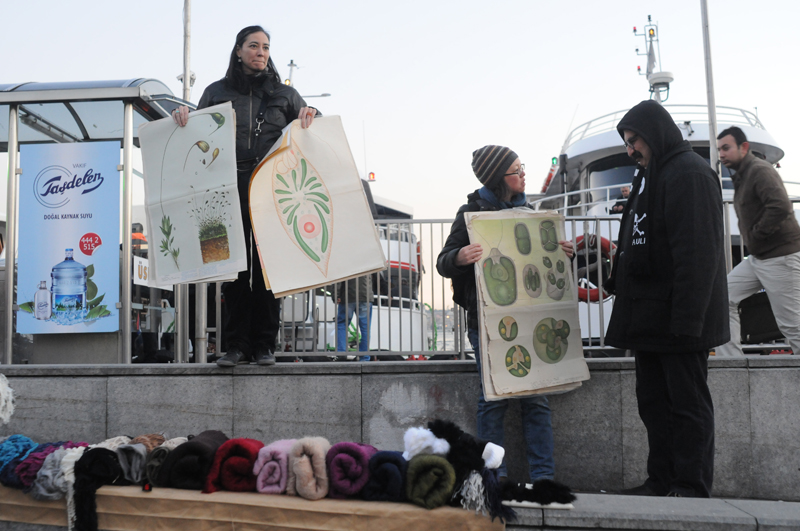 移动市集在伊斯坦布尔 The Mobile Bazaar in Istanbul |
如何一手翻转世界——移动市集
展示时间:2011年2月18日至3月17日 |
箭厂空间在北京和伊斯坦布尔搜罗了各种全新和二手的商品用以出售,其中包括茶杯,香料,运动鞋和手机。这个名为“移动市集”(Mobile Bazaar)的艺术项目是一个被设计成能够装在托运行李箱中的移动摊位,空间的负责人在近期往返于北京伊斯坦布尔和爱丁堡的跨国旅行中将在三个城市的不同地点销售其中的商品。在北京,我们将在箭厂空间展示 "移动市集",并安排三天的时间在城区不同地点进行街头销售,然后将它们打包巡回到下一个目的地爱丁堡。北京的销售地点分别为:鼓楼东大街,潘家园市场和箭厂空间。 来自不同国家,拥有不同背景的三家艺术机构如何建立合作关系?三者共同关心的议题和合作领域又在哪里?潜在的分歧又会是什么?为了对这些问题以及其中细节进行探讨,箭厂空间 (北京),PiST///艺术空间 (伊斯坦布尔) 和Collective画廊 (爱丁堡) 的负责人在伊斯坦布尔举行了为期三天的会议,共同确定了项目的合作框架。这个将持续一年的项目名为“如何一手翻转世界” (How to Turn the World by Hand),计划涵盖欧亚两大洲,将邀请来自三个不同国家的艺术家参与其中。 在此次会面之前三家艺术机构进行了前期讨论,发现三个空间都由曾经的临街店面改造而来,其中箭厂空间和PiST///艺术空间尤其相似。在被改造为艺术机构之前,两个空间都是位于居民社区中的零售商店,就像两旁仍在营业的店铺一样,为街坊邻居和路人带来便利。这两个空间因为这种特别的地理位置为当代艺术创造了一个契机,使其能够接触和介入身边和周围的社会环境。PiST///艺术空间和箭厂空间的活动具有跨界的特征,并不局限于严格意义上的“当代艺术”,因此不断地掩盖或模糊艺术和日常生活的界限。三家机构都由商店改造而来的事实——商业活动在非盈利空间或艺术家经营的空间中往往被视为禁忌——使策划一个多层面的项目变得切实可行,该项目将在我们此次合作的框架范围内对购买和出售,交易和商业等概念进行探讨。 “如何一手翻转世界”参照爱丁堡、伊斯坦布尔和北京三地的当代艺术生产,对“交易”(trade)一词的多重含义进行探讨。计划的第一步(已经开始实施)是改变三家艺术机构的外观。在接下来的一年中,箭厂空间,Collective画廊和PiST///艺术空间将在各自的标志和公共标识中加入三个城市的名称,好像它们在三地都设有分支机构或办公室。这种简单而有效的做法对外展示了我们三家机构的合作关系,其便捷性和直接性还带来一种效果,仿佛只需在标志中添加几个外国城市的名字就可以转眼间把地方性艺术空间变成一个跨国机构。 |
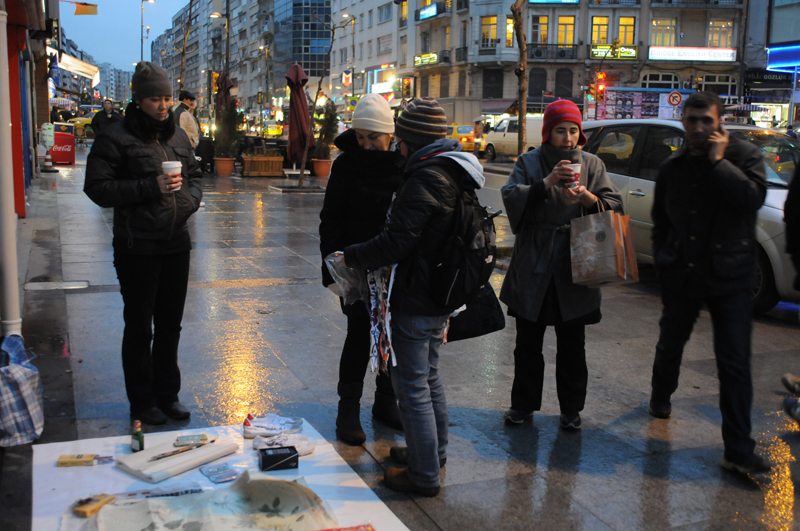 |
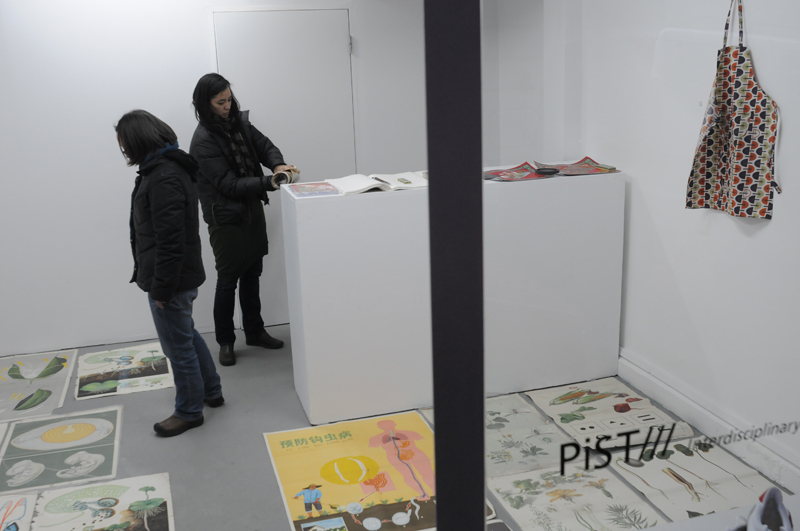 移动市集在伊斯坦布尔 The Mobile Bazaar in Istanbul |
“交易”在我们合作中的另一个含义是真正的交换,即艺术空间的交换和交易。作为“品牌合作”的延续,我们三家机构(箭厂空间,Collective画廊和PiST///艺术空间)在未来一年中将短时间进驻或接管彼此的空间。在伊斯坦布尔,PiST///艺术空间将让箭厂空间负责其日常管理,允许箭厂空间在接下来的一周内自由使用。在今年四月份,箭厂空间将把Collective画廊改造成专卖土耳其和中国产品的商店。随后PiST///艺术空间将前往北京的箭厂空间进行一项艺术计划,同时Collective画廊将安排艺术家前往伊斯坦布尔的PiST///艺术空间做短期驻留。这种交换是为了在艺术机构之间实现更深层和更自然的交流,并且带来和当地社区的全新联系。同时,这种交换也试图以一种幽默的方式表明,作为运营独立艺术空间的同行,我们的事业有相似之处。 作为第三种也是最后一种“交易”的方式,箭厂空间在伊斯坦布尔启动了“移动市集”计划,展开跨地区和跨文化的“进出口贸易”,借助国际艺术圈中通常的免费旅行,以箭厂空间标准的展览制作预算人民币1200元在北京购买一些全新或二手的商品,运往伊斯坦布尔进行销售或交换。商品的运输线路是从中国到土耳其,最后再到苏格兰,这暗合了传统贸易的路线(如丝绸之路)。但更重要的是,这符合今天全球化背景下人口的流动趋势,即人们大量从东方流动到西方,其中也包括艺术家,策展人和艺术专家,他们常年马不停蹄地参加在不同国家举行的各类双年展、艺术项目和会议。箭厂空间发起的“交易”方式——通过将商品从北京经土耳其运往苏格兰,建立一条临时的贸易通道——并没有一个严格的执行计划。在出口商品的选择上,我们并不考虑当地的实际需求或当地市场的情况,而是主观地选择我们认为伊斯坦布尔所缺乏的资源,和/或当地人可能感兴趣的东西。在商品部分售出之后,箭厂空间将利用所得购买当地的商品以便在北京销售,然后再继续这个过程,从北京收购商品并运往苏格兰销售。箭厂空间计划在爱丁堡的数个地点出售土耳其和中国的商品。 该项目计划于2012年1月结束。届时,三家机构将会联合出版一本有关该项目的小型文献,并将邀请艺术界同仁一起对这一年中的各项活动进行讨论,对这种交流的价值做出评估,分享各自在“如何一手翻转世界”项目中的成功和不足。 在此特别感谢Creative Scotland和Arthub Asia在项目实施过程中所给予的帮助。 |
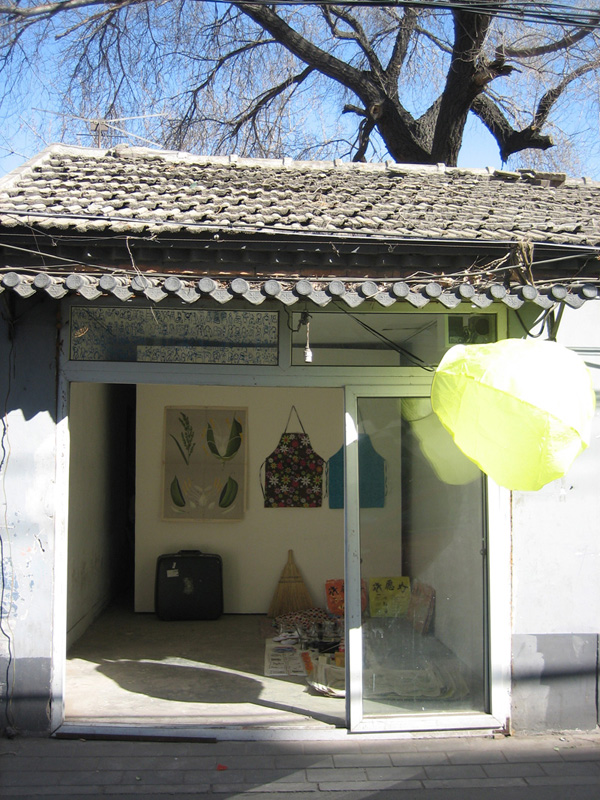 移动市集在北京 The Mobile Bazaar in Beijing |
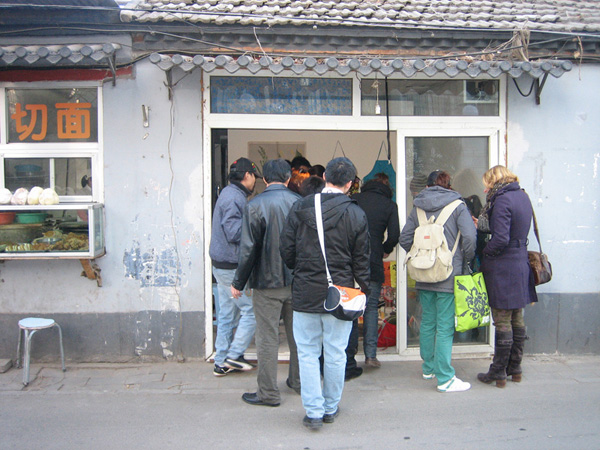 移动市集在北京 The Mobile Bazaar in Beijing |
How to Turn the World by Hand – A Mobile Bazaar
Exhibition: 2011.02.18 – 03.17
Bazaar dates: Arrow Factory - March 6, 2-5pm |
Teacups, spices, sports shoes, and a cell phone are just a few of the items in the Mobile Bazaar, a handpicked collection of new and used objects for sale culled from Beijing and Istanbul. The Mobile Bazaar is an eclectic roving shop stall designed to fit into checked-in baggage as it accompanies the organizers of Arrow Factory to/from their latest overseas journeys. Circulating between three cities: Beijing, Istanbul, and Edinburgh, the project inserts an informal sales stand into different locations throughout each city. Beijing’s Mobile Bazaar will be displayed at Arrow Factory and will be roaming at different times over the course of the next three weeks to Panjiayuan Market, Gulou Dongdajie, and Arrow Factory before it gets packed up and checked onto its next destination of Edinburgh. How to begin a collaboration that connects three different art spaces in three vastly different locations? What are the common areas of interest and points of overlap? And where do the schisms occur? Over three consecutive days in Istanbul, members of Arrow Factory (Beijing), PiST/// (Istanbul) and Collective (Edinburgh) held meetings and discussions to contemplate these very questions and more. What emerged was a strategic plan for a year-long project spanning across two continents and involving artists from three distinct regions dubbed How to Turn the World by Hand. All three of our art spaces share a distinct common feature – each used to function as a shop or storefront before being converted into a space for contemporary art. Arrow Factory and PiST/// share further overlap since both previously functioned as a retail business in the not so distant past and are embedded in tightly knit neighborhoods with existing adjacent small businesses catering to immediate residents and passersby. By the nature of their locations, these initiatives regularly create opportunities for contemporary art practices to engage with or come into direct contact with the immediate environment and surrounding social milieu. As a result the activities that occur in PiST/// and Arrow Factory register more often as anomaly than as ‘contemporary art’ per se, thus serving to continually blur or better yet, obscure the line between art and the sphere of everyday life. Being that all three spaces previously functioned as shops—and that commercial activity is normally as seen as anathema to the world of non-profit or artist-run art spaces—it seemed especially fitting to devise a multi-layered scheme that could tap into the notion of buying and selling, trading and commerce for our collaborative project. |
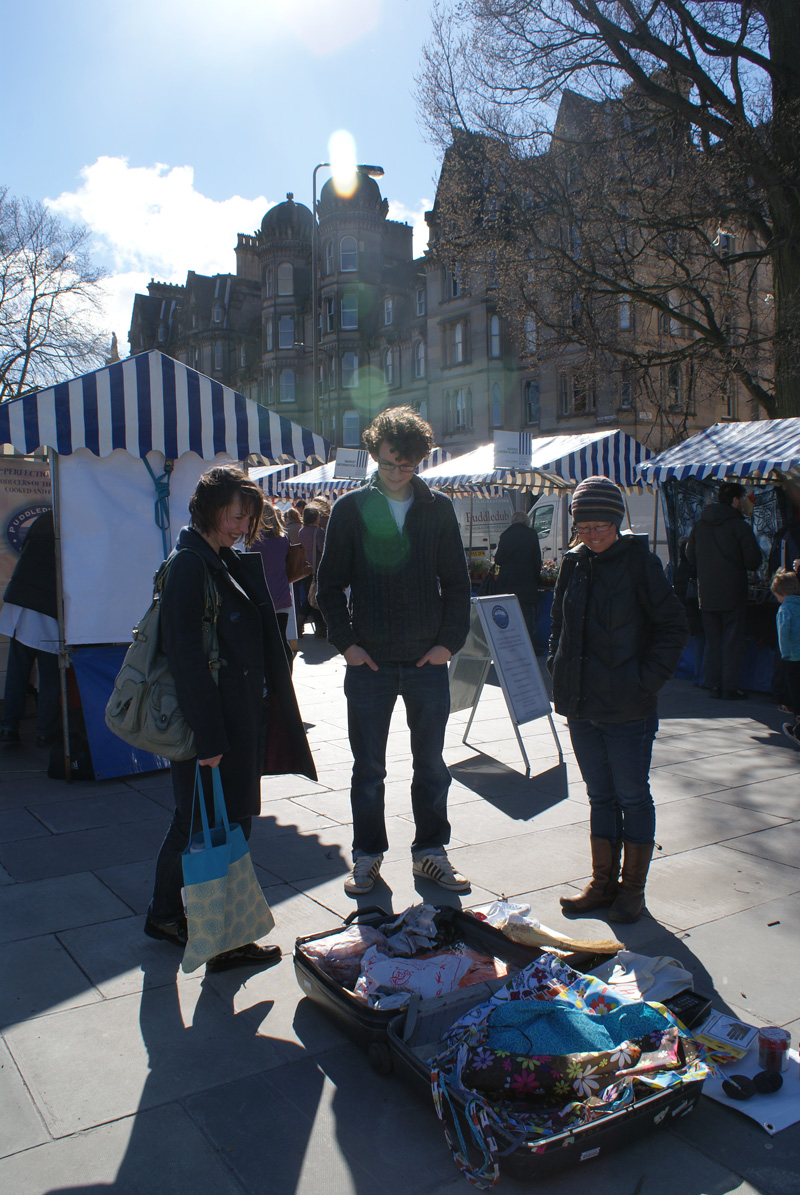 移动市集在爱丁堡 The Mobile Bazaar in Edinburgh |
How to Turn the World by Hand is conceived as an exploration of the myriad meanings of the word ‘trade’ with regards to contemporary art production as it occurs in our three locales: Edinburgh, Istanbul and Beijing. The first action (effective immediately) involves a purposefully superficial alteration—Arrow Factory, Collective and PiST/// will modify their logos and exterior signage for the coming year to include the names of each other’s cities, as if to indicate that each space has opened branches or sub-offices in three different locations. This simple yet potent gesture not only makes our collaboration outwardly recognizable but does so in an instantaneous fashion, playing with the idea that such a transition from ‘locally-run’ art space to ‘global’ brand is possible with the mere addition of a few keystrokes. Another aspect of trade that arises in our collaboration points to literal forms of exchange, namely the swapping and trading of art spaces. As an extension of our “co-branding”, our three art spaces (Arrow Factory, Collective and PiST///) will find ways to inhabit or take over each one’s respective space for a short period of time during the span of one year. In Istanbul, PiST/// handed over the keys to their space to Arrow Factory and allow them to occupy the space as they wished for a week. In April 2011 Arrow Factory will transform Collective’s Edinburgh gallery space into a shop selling imported goods from Turkey and China. Later in 2011 PiST/// will travel to Beijing to create a project in Arrow Factory, and similarly Collective will arrange for an artist to travel to Istanbul to do a short-term residency at PiST///. The swapping of art spaces is meant to enact a deeper and more spontaneous process of exchange between art spaces as well as elicit new relationships to the surrounding environments in which they are situated. It also playfully acknowledges our shared line of work, or trade, as frontsmen of independent art spaces. As a third and final way of initiating trade, Arrow Factory kicked off the Mobile Bazaar in Istanbul by directly engaging makeshift import/export business that drifts across geographic and cultural borders, tapping into the travel patterns of the international art world community. Using the standard production budget allocation for an exhibition at Arrow Factory (¥1200RMB or $180USD), the group purchased new and used goods in Beijing, which were then transported to Istanbul for sale or exchange. The movement of goods from China to Turkey and eventually Scotland echoes the logic of traditional trade routes (such as the Silk Road) but more importantly, is in keeping with the larger migrations of peoples as they move from east to west under the contemporary conditions of globalization. This includes artists, curators and art professionals who travel around the world for biennials, projects, and sundry meetings. The theme of trade activated by Arrow Factory—initiating an informal chain of commerce by transporting goods to and from Beijing, Scotland and Turkey —is also knowingly random. The selection of products brought to Istanbul is based not upon any actual demand for such items or previous knowledge of the region, but instead on perception of lacking resources and/or an imagined interest. After selling a portion of the goods in Istanbul, Arrow Factory used the money generated to purchase items in Turkey to bring back to Beijing. The process will repeat again from Beijing to Scotland as Arrow Factory plans to sell the goods from Turkey and China in various locations around Edinburgh. At the conclusion of the year-long project in January 2012, the members of each art space will meet again to launch a small publication documenting their collaboration and to discuss the past year’s activities with other participating members of the art world. At that moment it will be possible to review the merits of our exchange, and to revisit the successes and failures of three art spaces experimenting with How to Turn the World by Hand. How to Turn the World by Hand is made possible in part by the support of Creative Scotland and ArtHub Asia. |
| arrowfactory.org.cn | ||
|